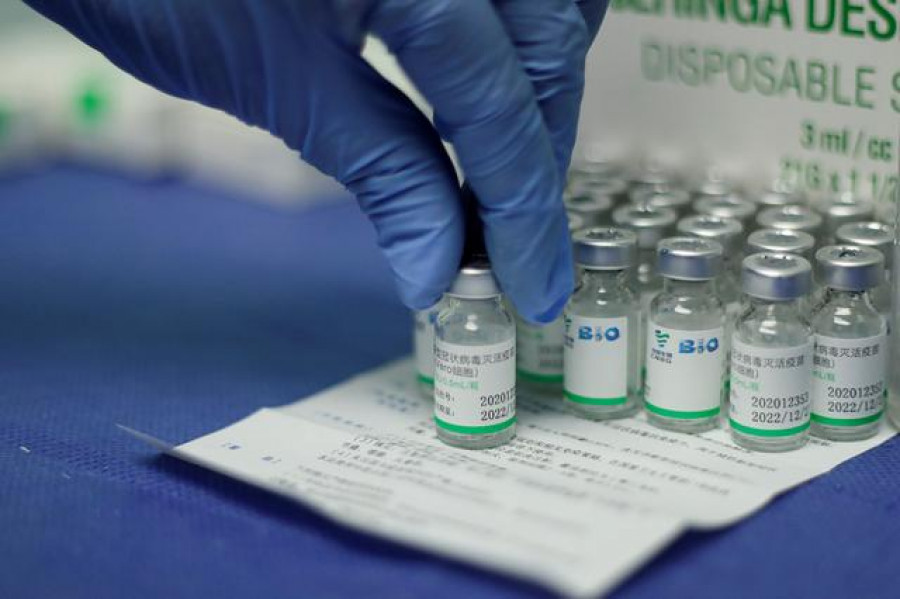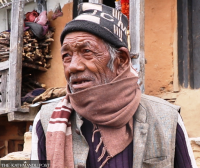National
Beijing announces vaccine aid amid Kathmandu’s hectic diplomatic push
Announcement follows President Bhandari’s requests to her Indian and Chinese counterparts. Respite for Nepal as the country battles virus and political crises.
Anil Giri
Amid no let-up in coronavirus cases, Nepal’s vaccine needs have just grown. Lately, the government, according to officials, has been trying every possible measure to acquire vaccines—from anywhere, at any cost.
And on Wednesday came a sudden announcement from the north. China said that it would provide 1 million doses of vaccine to Nepal under grant assistance.
“During today's phone conversation with Nepali President Bidya Devi Bhandari, Chinese President Xi Jinping announced that China will provide 1 million doses of Covid-19 vaccines to Nepal under grant assistance,” Chinese Ambassador to Nepal Hou Yanqi announced on Twitter.
There was an uncanny coincidence though.
Wednesday saw at least four high-profile diplomatic events, and initiatives in Kathmandu, New Delhi and Beijing.
The day began with India's reaction to recent political developments in Nepal. Five days after Prime Minister KP Sharma Oli dissolved the House of Representatives, for the second time in the last five months, New Delhi said it had taken note and that it viewed them as internal matters of Nepal to be dealt [with] by Nepal under its own domestic framework and democratic processes.
Immediately after, some Nepali politicians—Deputy Prime Minister Ishwar Pokhrel, National Assembly chair Ganesh Timilsina, former prime minister and Maoist Centre chair Pushpa Kamal Dahal, Nepali Congress’ Narayan Khadka, Janata Samajbadi Party chair Upendra Yadav, Rastriya Prajatantra Party chair Pashupati Sumsher Rana and Nepal Majdoor Kisan Party chair Narayan Man Bijukchhe participated in a virtual meeting with leaders of the Communist Party of China.
The Chinese delegation was led by Song Tao, head of the International Department of the Chinese Communist Party.
Discussions revolved around Covid-19 related assistance, including getting vaccines from China as early as possible.
Almost around the same time, the Office of the President said President Bidya Devi Bhandari wrote to her Indian counterpart Ram Nath Kovind, requesting the latter to take initiatives to ensure vaccine supplies from India.
Thereafter, President Bhandari held talks with Chinese President Xi Jinping, making a similar request—providing vaccines for Nepal.
“The way we are getting attention from major powers shows our requests are being taken seriously, not only by India and China but also by countries like the United States and the United Kingdom,” said Khadga KC, former head of the Department of International Relations at Tribhuvan University. “It also shows Nepals’ geopolitical and geostrategic significance for them. And there is no denying that Covid-19 vaccine is not just a global public good.”
It was not immediately clear which type of vaccine China is sending. Beijing earlier in March-end had sent 800,000 doses of Sinopharm’s BBIBP-CorV (Vero Cell).
The Chinese announcement of additional 1 million doses comes at a time when supplies from India have ground to a halt. Nepal became one of the first countries in the world to launch a vaccination drive against Covid-19 on January 27 with the 1 million doses of Covishield, the AstraZeneca type vaccine, manufactured by the Serum Institute of India.
China was quick to announce 300,00o doses of its vaccine in grants. It then increased the number of doses to 500,000 and later to 800,000.
Nepal meanwhile placed an order for 2 million doses of Covishield and paid in advance. Of the total order, 1 million doses arrived on February 21. The government did not take initiatives to bring in vaccines pledged by China. Officials had told the Post a few weeks ago that there was reluctance to accept Chinese vaccines, given multiple reasons, including geopolitical, as Prime Minister KP Sharma Oli feared antagonising New Delhi.
After wavering for weeks, the government on March 28 sent a Nepal Airlines plane to China to bring the vaccines. By this time, India had put exports of AstraZeneca vaccines on hold and the Serum had communicated to Nepal about its inability to provide the remaining 1 million doses.
April onwards, India descended into a coronavirus crisis, as the country started reporting over 300,000 new cases a day. Hospitals ran out of beds and oxygen supplies. People started dying in huge numbers. India itself was in dire need of medical supplies—and vaccines.
What India had started as its “vaccine maitri”, providing jabs to its neighbours, soon became an albatross around its neck, with the Narendra Modi government coming under fire.
It’s unclear when vaccines would arrive from India, but the announcement from China is very reassuring for Nepal. This could pave the way for the government to sign agreements in future with Chinese companies to procure more doses.
The Chinese support also comes amid a political upheaval in Kathmandu, where Oli has dissolved the House of Representatives and declared snap polls in November. The Nepal Communist Party (NCP), which the Chinese are believed to have instituted by investing a lot, has fallen apart—at least into three pieces.
“The way China, after the second dissolution of the House, took initiatives to engage Nepal’s major political parties is indicative of Beijing’s renewed interest amid changing power dynamics in Nepal,” said Rupak Sapkota, deputy executive director at Institute of Foreign Affairs.
Nepal’s Covid-19 crisis lately has drawn the world’s attention. Nepalis have been petitioning to demand that the United States provide the jabs to Nepal from around 60 million doses Washington has announced it would share with the world.
On May 12, in Washington, several members of the Congress expressed alarm about the situation in Nepal. According to The Washington Post, an official with the US Agency for International Development said “Nepal is now a priority for coronavirus-related aid...”
On May 22, some emergency aid from the US arrived in Nepal. “From the American People: The first of several flights w/emergency aid from @USAID have started arriving in #Nepal. These health supplies will help protect health care workers and battle the recent surge in #COVID19 cases in the country,” the US embassy in Kathmandu tweeted.
However, vaccines have not arrived from the US.
In an article for statnews.com on Wednesday, Gagan Thapa, Nepal’s former health minister, and Duncan Maru, an associate professor in the Department of Global Health at the Mount Sinai School of Medicine, called for US help, saying in ‘vaccine apartheid,’ Nepal is ground zero.
A few days ago, in Britain’s House of Lords, members questioned Boris Johnson’s government about what it was doing to extend support to Nepal in its fight against the coronavirus.
Many say as the government failed to activate its diplomatic channels to acquire medical supplies and vaccines, countries that are friends of Nepal and those who see strategic significance in Nepal have been doing their bit. But that's natural, according to them.
Nischal Nath Pandey, director at the Center for South Asian Studies, said there is no denying that vaccine diplomacy is in a full swing among major powers and it would be wrong to view vaccine cooperation in isolation, separating it from geopolitics.
“Now we realise that there is politics in vaccine diplomacy. We must redouble efforts to get access to the vaccines,” said Pandey. “We need to prod our embassies to work extra hours. Diplomacy is now centred around vaccines.”
After the coronavirus brought the world to its knees last year, developed countries raced to develop vaccines.
That the Covid-19 vaccine would become a new diplomatic currency was obvious.
Until early this year, India was doling out the jabs in donations in countries where it sought its sway. China did the same. While India faced a setback after the devastating second wave, China continued, increasing its outreach in South Asian countries. On April 27, China held five-country talks and assured them of full support and cooperation. India, Bhutan and the Maldives did not participate in the talks. This week, China released millions of Covid jabs to Bangladesh, Sri Lanka and Pakistan.
For Nepal, while one vaccine powerhouse in the south is struggling, another powerhouse in the north is there, if it can act tactfully, analysts say.
“China’s focus has been shifting towards the South Asian region due to Quad, a quadrilateral security dialogue between US, Japan, Australia and India, and recent US-India strategic ties,” said Sapkota. “So it is pursuing very proactive diplomacy in the Himalayan region.”
On Wednesday, during his phone conversation with President Bhandari, Xi said that Nepal is on Beijing’s priority and assured vaccine support and cooperation.
Amid the raging pandemic and volatile geopolitics as well as fluid domestic politics, Nepal, according to analysts, must tread carefully and pull out all the stops to secure vaccines.
“India is under pressure due to its own Covid-19 criss and it has to give priority to its own citizens. But Nepal needs vaccines,” said KC. “It must make an aggressive but nuanced approach to secure the jabs, steering clear of any risk of being caught between any sides. At present, the vaccine is diplomacy, the vaccine is a soft power tool, the vaccine is a strategic commodity.”




 15.12°C Kathmandu
15.12°C Kathmandu













